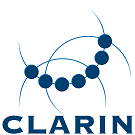Dictionaries: Difference between revisions
No edit summary |
No edit summary |
||
| Line 8: | Line 8: | ||
What determines the meanings of words? | What determines the meanings of words? | ||
== Historical Dictionaries == | |||
The Dutch Language Institute makes the following historical dictionaries available in one online search application (more information about the individual dictionaries can be found by following the hyperlinks): | |||
* Oudnederlands Woordenboek (ONW, Dictionary of Old Dutch) 500-1200 | |||
* Vroegmiddelnederlands Woordenboek (VMNW, Dictionary of Early Middle Dutch) 1200-1300 | |||
* Middelnederlandsch Woordenboek (MNW, Dictionary of Middle Dutch) 1250-1550 | |||
* Woordenboek der Nederlandsche Taal (WNT, Dictionary of the Dutch Language) 1500-1976 | |||
* Woordenboek der Friese Taal (WFT, Dictionary of the Frisian Language) 1800-1975 | |||
Together they describe the Dutch vocabulary from around 500 to 1976, and the Frisian vocabulary from 1800 to 1975. This dictionary application is a source of knowledge and joy for any language user, from language researchers to crossword puzzlers. | |||
Revision as of 14:54, 26 November 2020
Dictionary of Contemporary Dutch
The Dictionary of Contemporary Dutch (Algemeen Nederlands Woordenboek or ANW) is an online monolingual dictionary covering the period from 1970 until now. It describes the general Dutch language in the Netherlands, Flanders, Suriname and the Caribbean. Its focus is on written language. In 2009, the first ANW words were published online and the dictionary is updated every day. The ANW is an interactive dictionary. Additions and corrections are processed on a regular basis and comments from users are warmly welcomed.
Description of the vocabulary
The Dutch Language Institute (INT) describes the Dutch vocabulary on the basis of large amounts of source material. When compiling historical dictionaries, the researchers describe what the historical source material shows, without making any value judgements. That would be difficult to do anyway, given that in previous centuries there was no such thing as a standard language, let alone spelling rules. For contemporary dictionaries, the content of the sources is of course described as well, but deviations from the current spelling rules are always mentioned explicitly. What determines the meanings of words?
Historical Dictionaries
The Dutch Language Institute makes the following historical dictionaries available in one online search application (more information about the individual dictionaries can be found by following the hyperlinks):
- Oudnederlands Woordenboek (ONW, Dictionary of Old Dutch) 500-1200
- Vroegmiddelnederlands Woordenboek (VMNW, Dictionary of Early Middle Dutch) 1200-1300
- Middelnederlandsch Woordenboek (MNW, Dictionary of Middle Dutch) 1250-1550
- Woordenboek der Nederlandsche Taal (WNT, Dictionary of the Dutch Language) 1500-1976
- Woordenboek der Friese Taal (WFT, Dictionary of the Frisian Language) 1800-1975
Together they describe the Dutch vocabulary from around 500 to 1976, and the Frisian vocabulary from 1800 to 1975. This dictionary application is a source of knowledge and joy for any language user, from language researchers to crossword puzzlers.
